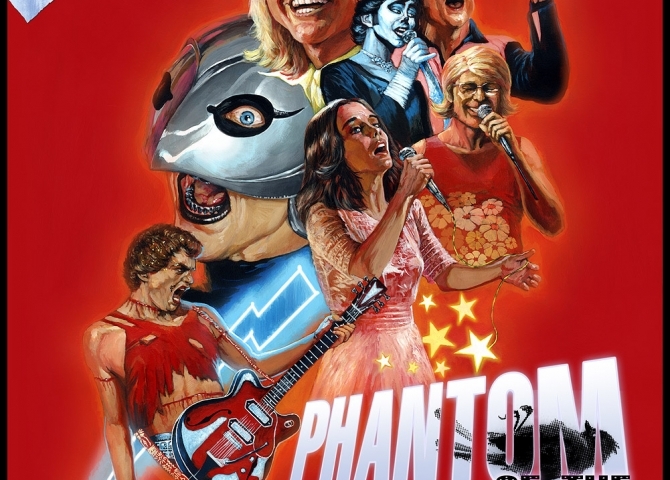“Phantom of the Paradise” is a 1974 musical written and directed by Brian De Palma; stars Paul Williams, William Finley, and Jessica Harper; and the soundtrack was done by Paul Williams. The film is a loosely adapted mixture of “The Phantom of the Opera,” “The Hunchback of Notre Dame,” “Faust,” and “The Cabinet of Dr. Caligari.” Despite having been a heavily panned commercial failure when it was released, it has been revived through a heavy cult following and currently has a 94% Fresh rating on review site rottentomatoes.com. It is currently available for stream through Amazon Instant Video, Google Play, as well as the numerous re-releases on DVD and Blu-Ray.
The story follows Winslow Leach (Finley), an aspiring singer and songwriter who catches the attention of a powerful music producer known only as Swan (Williams) during a backup performance for a nostalgia band. Swan expresses interest in using Winslow’s music, a rock opera version of “Faust,” to open his dream project, a rock theater called The Paradise. Swan tricks Winslow into giving him the sheet music without promise of compensation which Winslow doesn’t find out until he breaks into Swan’s mansion and meets Phoenix (Harper), one of many singers auditioning to be in Swan’s production of Winslow’s “Faust.” Swan responds to the break in by having Winslow beaten inches to his life and framed for dealing drugs. In prison, Winslow has his teeth removed and replaced with sharp metal instruments for medical experimentation (heavily implied to be another bit of revenge from Swan) and is forced into labor. One day, Winslow hears on a guard’s radio one of the songs from his version of “Faust” as a watered down pop version sung by the Juicy Fruits, the nostalgia band he sang backup to. This causes Winslow to go mad, escape jail, and try to take vengeance on Swan by blowing up the record factory producing the “Grease”-esq version of his “Faust.” However, when fleeing from security he has a near fatal accident inside of a record press that brutally disfigured his face and destroys his vocal cords. Angry and desperate, Winslow heads to the soon to be opened The Paradise and steals a costume to become the titular Phantom of the Paradise and attempts to kill The Juicy Fruits (which have been retooled to be the Beach Boys-esq band, The Beach Bums) with a bomb but fails. This leads to him being confronted by an oddly conciliatory Swan that gives Winslow a new voice and a chance to have his music produced in a way more suiting to Winslow’s desires. Winslow agrees on the condition that only Phoenix sings his music. Swan agrees and has Winslow sign a contract in blood. Swan almost immediately breaks his promise to Winslow and hires glam-rocker Beef to headline The Paradise’s opening alongside The Undead (previously The Beach Bums). Outraged, Winslow again dons his identity as the Phantom of the Paradise again to destroy the production and doing so unveils the figurative and literal demons behind the mysterious Swan in order to save Phoenix who herself has signed a contract with Swan and save his music from becoming a what he hates even more than Swan, pop music.
“Phantom of the Paradise” is an amazing experience that takes the magic and emotions of Phantom of the Opera and Faust and wraps it in what is easily one of the greatest soundtracks in film history that only feels dated in places that were intentionally dated, like the “Grease”-esq songs of the Juicy Fruits, or places where a dated feeling make the contrast with the songs written and done by the protagonists more timeless and emotional. Even then, its hard to call “Goodbye, Eddie, Goodbye” and “Upholstery” by the film’s The Juicy Fruits anything but catchy even if the nostalgia movement of the 1970’s has only gone further out of vogue. Despite the homages to “Faust” and the “Phantom of the Opera” feeling obtuse and obvious initially the film’s writing actually manages to keep certain things suspenseful and almost shocking despite still following those two stories. Even those familiar with the alluded to classics will still find themselves on the edge of their seats with mouths agape during the movies spectacular third act. The only flaws of the film are the pacing and the camera work. The opening act feels far too long and seems less like a first act and more like a heavily extended prologue. The third act feels far too rushed, though the feeling of the third act being rushed can just as easily be chalked up to not wanting the film to end. The camera work makes frequent abuse of first person shots in an attempt to hide Swan in the first act to keep up the air of mysteriousness. It sounds like a minor nitpicking but it has to be said considering there is a scene where Winslow as the Phantom strangles a stagehand to make sure Pheonix gets the perfect lighting. It also bears noting that despite the PG rating, this was made in the era where PG simply meant there was no explicit nudity and the language never goes harsher than a ‘damn’. The movie follows intensely dark themes and opens to an incredibly catchy song about a singer’s suicide, and points out the sleaze of the music industry’s drug pushing and use of the ‘casting couch’. All said and done, “Phantom of the Paradise” is very easily one of the best rock operas written and is almost perfect. Anyone who wants the suspense of “Phantom of the Opera” and the incredible writing of Faust wrapped up in soundtrack that has the fun catchiness of “Grease” should watch this movie and try to get as many people as they humanly can to watch it too.


'Phantom of Paradise' has no comments
Be the first to comment this post!